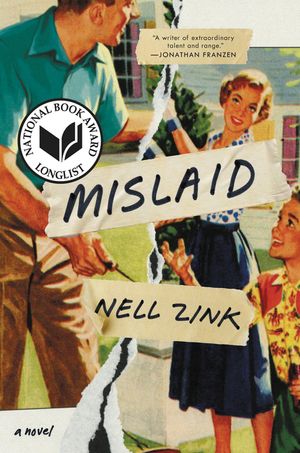‘Mislaid,’ by Nell ZinkPosted in Articles, Book/Video Reviews, Media Archive, Passing, United States on 2015-06-12 21:45Z by Steven |
Sunday Book Review
The New York Times
2015-06-04
Zink, Nell, Mislaid: A Novel (New York: Ecco/HarperCollins, 2015). 242 pages.
Toward the middle of Nell Zink’s “Mislaid,” a screwball comic novel of identity, Karen, a Southern white girl whose lesbian mother has raised her as black for complicated reasons, innocently asks a new friend, as though she were inquiring about her major: “What minority are you?”
“Hispanic,” her friend replies. “We’ve never done the genealogy, but you can tell by my name.”
In context, this is a laugh line, since the book has already answered, in a hundred ways, the question of what exactly is in a name: Nothing. Names mean nothing. They are labels stamped on mysteries, absurdly reductive and misleading. The same goes for racial and gender designations, which, in the book, are infallibly irrelevant to the highly individual business of living and loving according to our instincts rather than larger, social expectations. In “Mislaid” everyone is a minority — of one…
…When Peggy finally leaves her husband, afraid that he’ll commit her to a psych ward for various acts of dramatic exasperation (including driving their car into the lake), she takes their daughter but leaves their son behind, setting the stage for a latter-day fairy tale thick with misunderstandings and coincidences, concealments and revelations. Rigging up the machinery of this plot consumes a lot of narrative energy and asks us to suspend our disbelief to greater and greater degrees, changing the book from a comedy of manners into an outright comedy of errors. Peggy moves into an abandoned house in a historically black rural settlement and gets her hands on a dead child’s birth certificate, which she uses to conceal her daughter’s past. She renames herself Meg and her daughter becomes “Karen,” who, per the stolen certificate, is black. “Maybe you have to be from the South to get your head around blond black people,” the helpful narrator chimes in by way of quieting readers’ skepticism. “Virginia was settled before slavery began, and it was diverse. There were tawny black people with hazel eyes. Black people with auburn hair, skin like butter and eyes of deep blue green. Blond, blue-eyed black people resembling a recent chairman of the N.A.A.C.P. The only way to tell white from colored for purposes of segregation was the one-drop rule: If one of your ancestors was black — ever in the history of the world, all the way back to Noah’s son Ham — so were you.”…
Read the entire review here.

